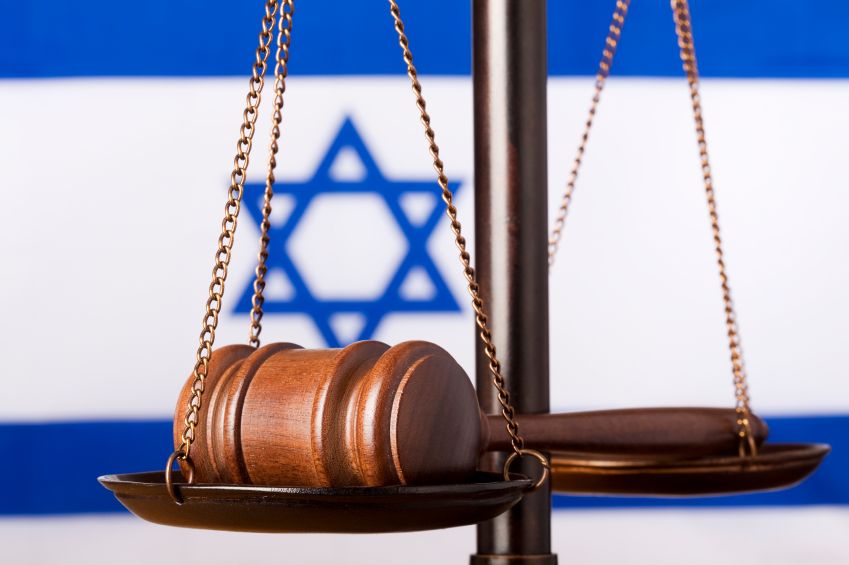For Parashat Shofetim
Halakha, the Jewish legal system, is a labyrinthian structure of arguments and counter-arguments, with hundreds of rabbis in each generation opining on numerous matters, and only few rising to the status of authority recognized by all. Tens of thousands of volumes published and probably a thousand others lost to persecution, book-burning, and wandering. The details concerning the fulfilment of the Mitzvoth, sometimes complicated beyond the grasp of mere mortals, gave birth to specialized books dedicated to one mitzvah or concept: Kiddush, KeZayit, Eruv Tavshilin, Muktzeh on Shabbat, etc. Orthodox Jews got used to the idea that in order to conduct an observant life one must complete studies equivalent to a college degree, drag behind him a wagon loaded with books, and consult a rabbi on every question, including where to spend Shabbat and what to wear.
This unhealthy state-of-affairs, which has caused many to denounce the observant lifestyle, and prompted orthodox theologians to declare that the purpose of Torah and Mitzvoth is to discipline mankind, and to cleanse our sins through the suffering endured in keeping the mitzvoth, can be traced back to one paragraph in this week’s Parasha (Deut. 17: 8-12), presented here with free translation:
כִּ֣י יִפָּלֵא֩ מִמְּךָ֙ דָבָ֜ר לַמִּשְׁפָּ֗ט בֵּֽין־דָּ֨ם׀ לְדָ֜ם בֵּֽין־דִּ֣ין לְדִ֗ין וּבֵ֥ין נֶ֙גַע֙ לָנֶ֔גַע דִּבְרֵ֥י רִיבֹ֖ת בִּשְׁעָרֶ֑יךָ וְקַמְתָּ֣ וְעָלִ֔יתָ אֶל־הַמָּק֔וֹם אֲשֶׁ֥ר יִבְחַ֛ר יְי אֱלֹהֶ֖יךָ בּֽוֹ. וּבָאתָ֗ אֶל־הַכֹּהֲנִים֙ הַלְוִיִּ֔ם וְאֶל־הַשֹּׁפֵ֔ט אֲשֶׁ֥ר יִהְיֶ֖ה בַּיָּמִ֣ים הָהֵ֑ם וְדָרַשְׁתָּ֙ וְהִגִּ֣ידוּ לְךָ֔ אֵ֖ת דְּבַ֥ר הַמִּשְׁפָּֽט. וְעָשִׂ֗יתָ עַל־פִּ֤י הַדָּבָר֙ אֲשֶׁ֣ר יַגִּ֣ידֽוּ לְךָ֔ מִן־הַמָּק֣וֹם הַה֔וּא אֲשֶׁ֖ר יִבְחַ֣ר יְי וְשָׁמַרְתָּ֣ לַעֲשׂ֔וֹת כְּכֹ֖ל אֲשֶׁ֥ר יוֹרֽוּךָ. עַל־פִּ֨י הַתּוֹרָ֜ה אֲשֶׁ֣ר יוֹר֗וּךָ וְעַל־הַמִּשְׁפָּ֛ט אֲשֶׁר־יֹאמְר֥וּ לְךָ֖ תַּעֲשֶׂ֑ה לֹ֣א תָס֗וּר מִן־הַדָּבָ֛ר אֲשֶׁר־יַגִּ֥ידֽוּ לְךָ֖ יָמִ֥ין וּשְׂמֹֽאל. וְהָאִ֞ישׁ אֲשֶׁר־יַעֲשֶׂ֣ה בְזָד֗וֹן לְבִלְתִּ֨י שְׁמֹ֤עַ אֶל־הַכֹּהֵן֙ הָעֹמֵ֞ד לְשָׁ֤רֶת שָׁם֙ אֶת־יְי אֱלֹהֶ֔יךָ א֖וֹ אֶל־הַשֹּׁפֵ֑ט וּמֵת֙ הָאִ֣ישׁ הַה֔וּא וּבִֽעַרְתָּ֥ הָרָ֖ע מִיִּשְׂרָאֵֽל
8) When a matter will be difficult to judge, between blood and blood, between verdict and verdict, and between plague and plague, matters of conflict in your gates, you should rise and go up to the place which God will have chosen. 9) You should come to the Cohanim, the Levites, and the judge who will preside on those days, you shall seek and be told by them the verdict. 10) You shall follow the verdict they will tell you from that place which God will choose, and you shall be careful to follow their word. 11) In accordance with the Torah they will teach you and the verdict they will give you, you should act, you should not veer from the verdict they tell you to the right or to the left. 12) He who will act deliberately, not obeying the Cohen who stands there to serve God, or the judge, will be put to death, so all Israel will hear and revere and will sin no more.
The meaning of verses 9-12 seems quite clear, even if a bit harsh: In cases of doubt one should turn to the central court in Jerusalem and follow its ruling. The problem is with the first seventeen words of this paragraph. An anonymous Mishnaic source, quoted in the Talmud (San. 86:2-87:1) explains that they address the head of the local Beth Din, who is unable to reach a Halakhic decision:כי יפלא ממך: במופלא שבבית דין הכתוב מדבר
The rest of the sentence, accordingly, is understood as dealing with court matters which the judges cannot agree on, and which cover all areas of Jewish law:
בין דם לדם – בין דם נדה, דם לידה, דם זיבה. בין דין לדין – בין דיני נפשות, דיני ממונות, דיני מכות, בין נגע לנגע – בין נגעי אדם, נגעי בתים, נגעי בגדים, דברי – אלו החרמים והערכין וההקדשות. ריבת – זו השקאת סוטה, ועריפת עגלה, וטהרת מצורע. בשעריך – זו לקט שכחה ופאה
Between blood and blood – the blood of menstruation, birth, and sexually transmitted diseases; Between verdict and verdict – capital, monetary, and corporal punishments; Between plague and plague – leprosy in humans, houses, and garments; Matters – of dedications and donations to the Temple; Conflict – that of a deviate woman, beheading the heifer [in case a body was found in the field], and the purification of the leper; In your gates – this refers to falling stalks, forgotten sheaves, and the corner of the field.
According to this interpretation, the paragraph is dealing with a court which is unable to reach a decision, and therefore must submit its question to the supreme court in Jerusalem. The matters in which a doubt can occur encompass all fields of Halakhic literature and delineate the authority of local and city courts. It follows that the one who disobeys the supreme court is himself a judge, and his refusal to adhere to the verdict makes him a זקן ממרא – a rebellious elder.
I do not wish to challenge the Talmudic interpretation, but I would like to suggest an alternative reading of the text which draws a picture of a completely different, and even revolutionary, judicial system offered by the Torah.
The phrase כי יפלא ממך דבר למשפט should be translated as: when you are unable to reach a verdict. This refers to cases where there are two litigants, and no to personal or ritualistic questions. The word יפלא – means that it will be distinct, beyond your ability, and the word משפט does not mean judgment or deliberations, but rather final verdict. The Torah does not speak about a scholarly debate between two rabbis regarding the interpretation of the law, whether it is leprosy, menstrual impurity, tithes, prayers, or sacrifices, but rather of a protracted legal battle between two litigants, and especially cases where one side is not willing to abide by the decision of the court. These cases involve דם – murder, דין – monetary issues, and נגע – physical damage, and they all fall under the category of דברי ריבות בשעריך – conflicts at your gates. These cases might have evolved into feuds between families and clans, and the local Beth Din would not have been able to reach a resolution.
The Torah offers in such cases a solution similar to that of the Gordian Knot – cut through it. The litigants are told to address the central court, which has the final decision. That court does not dwell too much on precedents and deliberations, and focuses on providing a final solution, which the litigants must accept under threat of capital punishment. Though it would be very tempting to use such a method to ease the burden of the backlogged American judicial system, it is very unlikely, but the Torah offers the litigants a simple choice: either follow the ruling of your local court or that of the central court. There is no other option and there is no dragging of judicial procedures, known in Hebrew as עינוי דין – the Torture of Justice.
Finally, it is highly significant that the Torah refers the litigants to “the judge who will then preside”. The Torah’s ideal judicial system is one which does not rely on precedents and which is undaunted by the rulings of luminaries of past centuries. The judge, rabbi, Dayyan, or scholar who lived in the past can provide us with insights and guidance, but not a final verdict, because life keeps changing and only the contemporary judge can fully comprehend the circumstances of a problem and the consequences of a ruling. The state-of-affairs in the world of Jewish law is unhealthy. Halakha suffers from paralysis, accumulation of debris because of the inability to review and update previous rulings, and mass desertions by people who feel that Halakha is detached from their life and from reality. This sad picture can change if rabbinic leadership will be willing to step out of its ivory tower and listen to the voice and the needs of the people. Until then, we will keep praying for the fulfilment of the prophecy of Isaiah (1:26):
וְאָשִׁ֤יבָה שֹׁפְטַ֙יִךְ֙ כְּבָרִ֣אשֹׁנָ֔ה וְיֹעֲצַ֖יִךְ כְּבַתְּחִלָּ֑ה אַחֲרֵי־כֵ֗ן יִקָּ֤רֵא לָךְ֙ עִ֣יר הַצֶּ֔דֶק קִרְיָ֖ה נֶאֱמָנָֽה
I will restore your judges and counselors as in the beginning, and you will then be called the City of Justice.









Ohr HaChaim Yomi – Shemini